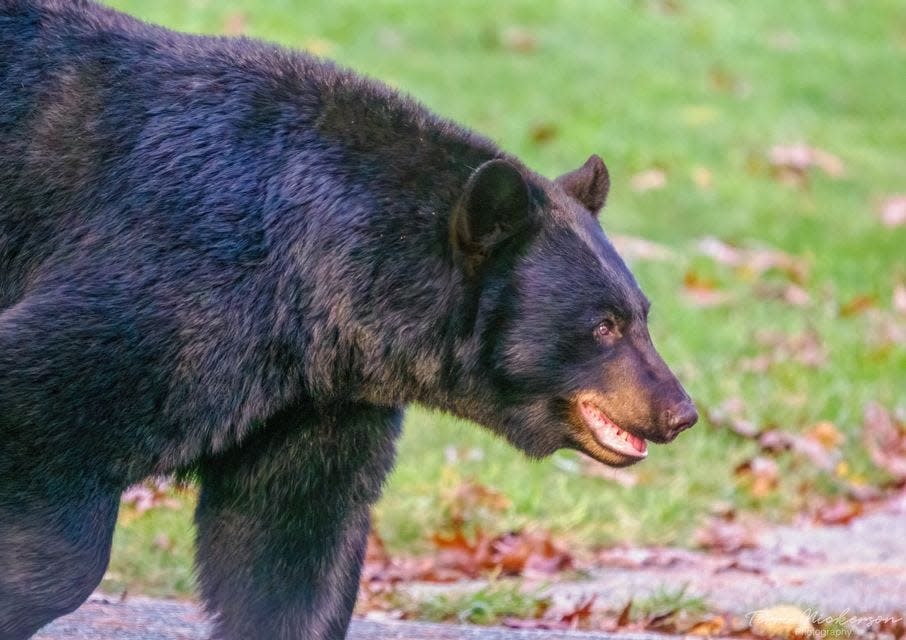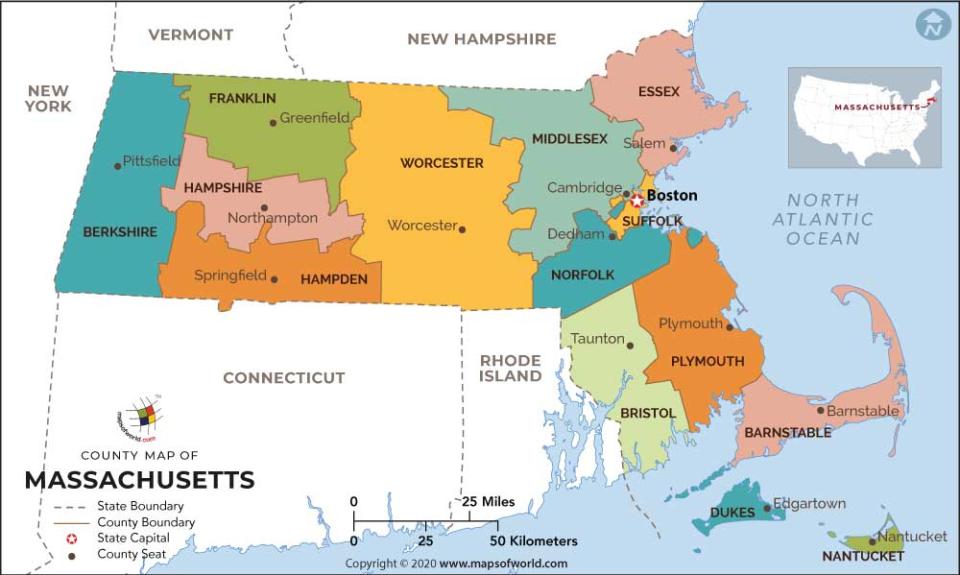Hanson has said it'll shoot Pumpkin the black bear. What about Pembroke and Whitman?
Pumpkin’s fate is not sealed.
The male black bear, who got his name after he was seen munching pumpkins, was spotted first in Whitman and then Hanson, where he is believed to have killed livestock twice at the same location despite the presence of electric fencing and other protective measures.
Hanson police said the bear’s growing taste for everything from birdseed to goats makes it unlikely he would leave the area on his own and could result in more damage to property, as well as an increased risk to animals and perhaps even people.
Given that, the police department announced it would seek to kill the bear, if possible, with the aid of state Environmental Police and its Large Animal Response Team, which includes biologists from MassWildlife. Hanson police, however, said they are not actively seeking out the bear.
Pumpkin has gone quiet since the most recent incident Nov. 1. If he decides to move on from Hanson, he may find safer shelter in other towns before finding a place to hibernate, or den, for the winter.

Pumpkin poses no risk to people so far
Whitman Police Chief Timothy Hanlon said Pumpkin was seen in his town on Halloween, but he, like others, said the bear was not acting aggressively toward people.
His department contacted State Police, which dispatched Lt. Wil Gray to the town.
“(He) offered us advice on how to handle bear reports while remaining in the area to monitor the bear’s movements and inform the residents who had questions,” Hanlon said. “Lt. Gray reported that the bear was acting appropriately, meaning it didn’t appear aggressive, and at one point the bear fled away from him as he approached from a distance."
Hanlon said his department has not received any other bear sightings since then.
If Pumpkin loops back to Whitman, Hanlon said the bear wouldn’t immediately be targeted.
“We have also not decided on Pumpkin’s fate," he said. “That will have to be based on the circumstances.”
Pembroke bear is not Pumpkin
Pembroke, meanwhile, has been dealing with its own bear.
“The bear encounters in Pembroke have mostly been encounters where the bear was just going after birdseeds or other feed from residences that had goats or animals similar in nature and never actually attacked them,” said Pembroke Police Chief Richard MacDonald.
He said the bear seen in Pembroke is not the same one in Hanson or Whitman based on size and other physical differences. He said his department has options in dealing with bears.
More: Black bear spotted in Whitman on Halloween
“This department and our officers have other means to keep a bear from public areas,” he said. “They carry bear repellent and less-than-lethal beanbag rounds from a shotgun, which has been used successfully several times, never harming the bear while scaring them away.”
Like his Whitman counterpart, MacDonald said he is heeding the advice offered by the Environmental Police and its guidance that a bear is not likely to abandon a consistent food source, which is why the No. 1 advice to residents along the South Shore has been to secure outdoor trash, remove bird feeders and keep livestock as protected as possible.
“Most times we will just monitor the bear while in public areas until it goes back to unpopulated areas,” MacDonald said.
The chief said his department would seek all other options before taking any lethal actions if a situation like Hanson’s arise.
“We will continue to deter the bear issue like we have in the past, but if it ever poses a threat to public safety based on its action only, we will have to seek other means," he said.
Hibernation season approaches
The bear’s increased appetite comes ahead of the species’ hibernation period, which begins anywhere from mid-November to mid-December.
MassWilidlife biologist and bear expert David Wattles said that period can be delayed, or even canceled altogether, if food remains readily available over the winter and the weather conditions are mild enough.
Pumpkin and other bears are also at risk of being killed by hunters. A second period of hunting season began Nov. 6 and continues through Nov. 25.

The number of bears killed, or harvested, by hunters annually is available online. There were 223 reported harvests in 2022, which is in line with the five-year average of 235. As a sign of how relatively new bears are in the eastern part of the state, all the reported harvests were from Middlesex County west.
Killings, relocation of black bears not common in Massachusetts
“While there are more than 4,500 bears estimated to live in Massachusetts, the Large Animal Response Team typically immobilizes and relocates less than five bears each year,” said Nicole McSweeney, assistant director of outreach and education for MassWildlife. “These are all bears which needed to be moved out of highly developed, urban areas. These were not bears causing property damage.”
She said MassWildlife, which does not advocate for the bear's death while also ceding the decision to local law enforcement, does not usually relocate bears such as Pumpkin.
More: Why Pumpkin the bear is considered too dangerous to relocate
“Relocation is not an option for bears causing property damage, as it would transfer problem behavior to another community,” she said. “Bears that have learned to raid chicken coops or attack livestock will not stop that behavior if moved elsewhere.”
She said the only animals that are relocated by MassWildlife and other agencies are moved to resolve an immediate public safety threat that is not caused by the animal’s behavior so much as by its location, such as a high-traffic area where the bear could cause an accident.
McSweeney said law enforcement typically kills fewer than five bears a year statewide.
She said under certain circumstances, state law allows landowners to kill a bear that is caught in the act of damaging property,
“On average, less than 10 bears are reported to MassWildlife annually to be taken by landowners under (state law),” she said.
McSweeney reiterated MassWildlife’s message to people in the eastern part of the state that coexistence with bears is possible, as residents of Western Massachusetts, where bears have long been a common sight, have known for some time.
“As the bear range expands eastward toward the most densely populated communities of Massachusetts, it is critical that the public be proactive and take a few, simple precautionary measures to help keep bears wild,” she said.
This article originally appeared on The Patriot Ledger: South Shore bears prepare for hibernation amid hunting season

